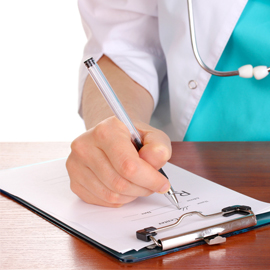
Before weight loss surgery, Dr. Bagnato and your insurance company may require a number of tests and evaluations to ensure that you’re mentally and physically prepared for bariatric surgery. In this article we discuss what you may experience as we begin Pre-Surgical Testing for Bariatric Surgery
Testing for Bariatric Surgery you may be required to undergo include:
- Psychological Screening: You’ll need to meet with a mental health professional as part of the Pre-Surgical Testing for Bariatric Surgery. This will make sure that you’re in a healthy mental state and adequately prepared for the changes that will come with surgery. Your medical team will also want to make sure you’ve addressed any eating disorders, addictions, or other underlying emotional problems. The psychological screening will also verify that you have realistic weight loss goals.
- Dietary Evaluation: A registered dietitian will instruct you on proper diet before and after surgery. Your diet may also be monitored after surgery to make sure you don’t become malnourished. In addition, you’ll need to discuss any vitamins, supplements, herbs, or medications you’re taking (or plan to take) with your nutrition expert.
- Blood Tests: Your doctor will likely order a complete blood count (CBC), metabolic panel, liver function test, and other blood work as part of your Pre-Surgical Testing for Bariatric Surgery. In most cases, all of these tests can be done with one blood draw. These tests are designed to make sure that you aren’t suffering from any vitamin deficiencies and that all of your internal organs are working properly. If there are any problems with your body’s normal function, your surgeon may recommend treatment before surgery.
- Urinalysis: Your doctor will request a urine sample to test for infection, pregnancy, and, in some cases, nicotine.
- Electrocardiogram (EKG): An EKG will tell your doctor if your heart beats normally, if you have any scar tissue from a previous heart attack, and whether or not the heart is generally functioning well. This test is crucial for preventing serious complications, including death, during and after surgery. In most cases, an EKG is the only cardiac test required before gastric banding. However, if your medical history or EKG suggests there may be additional problems, your doctor may also order an echocardiogram, angiogram, or stress test.
- Pulmonary Tests: Most hospitals will require a chest x-ray for all patients who are going to receive general anesthesia. The chest x-ray will provide your surgeon with a general idea of your lung health. If your chest x-ray is abnormal, or if you suffer from asthma, frequent shortness of breath, or sleep apnea, your surgeon may order additional pulmonary tests. These may include a chest CAT scan, an oximetry, an arterial blood gas test, a spirometry, or a sleep study. If any respiratory problems are discovered, you may be sent to a pulmonologist for treatment before being able to have gastric banding.
- Gallbladder Ultrasound: Gastric banding patients who lose weight quickly are at an increased risk for developing gallstones. Because of this, your doctor may order an ultrasound before surgery to see if there are any stones present and help determine if you should have your gallbladder removed during your bariatric procedure.
- Upper Gastrointestinal Tests: An upper GI series will look at how well your esophagus, stomach, and some of your small intestine are functioning. You’ll drink a barium liquid and then have an X-ray. Your doctor may also order an upper endoscopy to look for inflammation, ulcers, or growths that may need treatment before your weight loss surgery.
You may need to undergo some or all of these tests, depending on your family history and personal medical history. In addition to a comprehensive physical, you may also require regular screening tests, such as pap smear (for women), prostate exam (for men), or colonoscopy (for people over 50).

